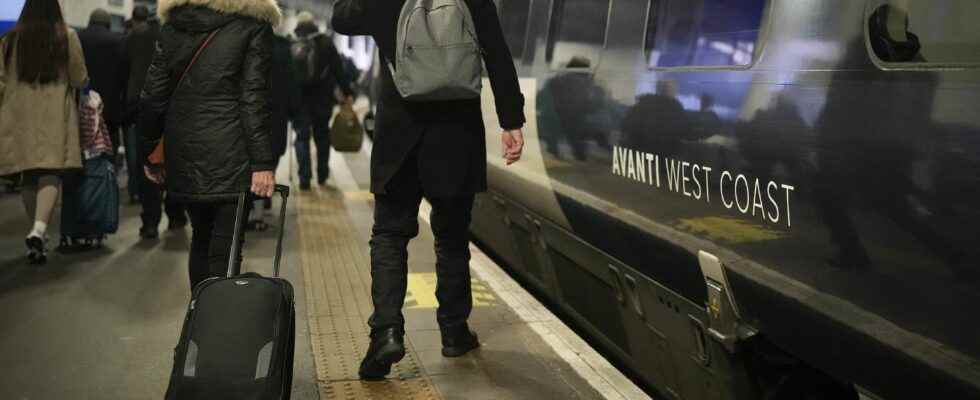Faced with galloping inflation (+ 11%), many Britons, all areas combined, are preparing to take part in the strike. The first began this Tuesday, December 13 in the morning with a mobilization of the railways, which prevented many people from going to work, according to the daily The Guardian. According to the RMT union, 40,000 of its members who work on the Network Rail rail network and 14 train companies are taking part in the movement which is beginning and will continue on Wednesday, Friday and Saturday, as well as four days in January. Only 20% of the trains should run.
In response, the British Secretary of State for Transport, regretted that these strikes were going to force families to spend another Christmas “under glass”, after two years of Covid, also regretting the refusal of the union wage agreement. For its part, the Network Rail union said the strikes “would cause misery for passengers across the country”. But the general secretary of the RMT, Mick Lynch, pledged to continue the battle for “decent wage increases and good working conditions”, as railway workers have been mobilizing since the summer. “10 days of strike is more than what we have experienced in the last six months. It is a dramatic escalation of the RMT”, regretted, pessimistic, Andrew Haines, president of the company Network Rail on the BBC. The company recommends to all its customers to travel only in case of “absolute necessity” during the strike. The company is already announcing that some trains will run between 7:30 a.m. and 6:30 p.m. during the movement, but traffic will be zero in some parts of the country, including most of Scotland and Wales. .
A winter of “discontent”
Railway workers are not the only ones to mobilize in the face of soaring prices. The British media are already talking about a new “winter of discontent”, referring to the massive strikes that shook the country at the end of the 1970s. And for good reason: more than a million workers are preparing to strike between 13 and on December 31, at the call of unions from different sectors.
From Wednesday, some 115,000 Royal Mail agents will join the railway workers. On Thursday, it will be the turn of nurses in England, Northern Ireland and Wales to enter the dance after a meeting between the union and the Secretary of State for Health ended in deadlock. “The government has been true to their word, they haven’t talked to me about pay,” said Pat Cullen, head of the main carers’ union. In total, more than 100,000 nurses affiliated with 50 hospitals across the country voted to strike, at the call of their union, the Royal College of Nursing (RCN), for the first time since the latter’s creation more than a hundred years old. A strike which is announced renewed for December 21, in which the paramedics will also take part. To alleviate the problems, the government called in the army. According to the Guardian six hundred servicemen from the three armed forces begin training to drive ambulances to provide cover for striking workers from National Health Service (NHC) across the UK.
Call for the army to avoid too many blockages
Baggage handlers will also walk out at Heathrow airport in London, as will Eurostar security personnel from Friday and throughout the weekend according to the BBC. Here again, the British executive is forced to call on the army to avoid too many blockages. Military personnel should carry out security checks instead of border police officers.
The private sector is not spared, with the Unite union raising the threat of a strike at brewer Greene King and a shortage of beer for the holidays. At the heart of all these demands for better wages: inflation, which has reached more than 11%, fueled by energy prices, particularly under the effect of the Russian invasion of Ukraine.
Many of its workers have actually been on strike for several months. Already, the month of October had been marked by numerous mobilizations. The country also recorded the highest number of working days lost due to labor disputes that month in more than 10 years, according to official data released on Tuesday. Between June and October this year, more than 1.1 million working days were lost, according to ONS figures, the highest in five months since the early 1990s.
While some smaller disputes, mainly in the private sector, have been resolved, the government has so far refused to budge on public sector wages and is instead seeking to strengthen laws to make it harder for people in the workplace to strike. key sectors. Conservative Prime Minister Rishi Sunak, whose government is lagging in the polls, struck a tough tone and promised “tough new laws” to tackle the consequences of the strikes. The government says the wage increases demanded are unaffordable and that raising wages to match inflation would only make the problem worse. “Any action that risks embedding high prices in our economy will only prolong the pain for everyone and set back any prospect of long-term economic growth,” Finance Minister Jeremy Hunt said.
